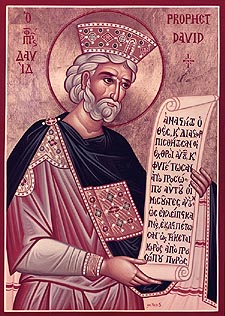History
Following the Law in the Bible are those books which are called historical. They cover the history of Israel from the settlement in the promised land of Canaan to the first centuries before Christ. They include Joshua, Judges, Ruth, 1 and 2 Samuel, 1 and 2 Kings, 1 and 2 Chronicles, Ezra, Nehemiah, and Esther, as well as 1 and 2 Esdras, Tobit, Judith, and 1 and 2 Maccabees, which in the English Bible includes 3 Maccabees.
In the biblical listing of the Orthodox Church, which is generally that of the Septuagint, the Greek translation of the Hebrew Bible, 1 and 2 Samuel are called 1 and 2 Kings, and 1 and 2 Kings are called 3 and 4 Kings. Also, the so-called apocryphal books, listed above after Esther, are considered by the Orthodox as genuine parts of the Bible. The Old Testament apocrypha is a body of writings considered by the non-Orthodox to be of close association with the Bible, but not actually part of its official canonical contents.
The Book of Joshua begins with the People of Israel crossing over the Jordan River and into the promised land led by Joshua, the successor of Moses. It tells of the victories of the Israelites over the local inhabitants, and the settlement of the twelve tribes in the territories appointed to each by Moses.
The Book of Judges tells of the period when the Israelites were ruled by the “judges” whom God appointed, the most famous being Ehud, Deborah, Gideon, Jephthah, and Samson. During this period, the Israelites were often unfaithful to God and given to evil. They were constantly at war with themselves and their neighbors. The book ends with the line: “In those days there was no king in Israel; every man did what was right in his eyes” (Judg 23.25).
The Book of Ruth is a very short story of the Moabite woman whom God blessed to be the wife of Boaz, the great-grandmother of David the King.

The books of Samuel and Kings begin with the birth of Samuel, the prophet whom God chose to anoint Saul as the first king of Israel. Until Saul there was no king, for God Himself was to be King for His People. Yet Israel wished to be “like all the nations” and God yielded, with reluctance, to their desires (Sam 8). Saul soon became evil and God sent Samuel to anoint David, the shepherd boy, as king in his place. Saul was enraged and made war against David, but David was merciful to him though he could easily have killed him. During this whole time, the Israelites were constantly at war. Saul finally killed himself rather than be taken in battle, and David became the only king. Having subdued all of his enemies, both within Israel and without, David established a glorious kingdom centered in Jerusalem, the city which he built. David’s son, Solomon, favored by God with great wisdom, enlarged his father’s kingdom and built the great temple for God on Mount Zion. The kingship of David and Solomon lasted from 1000–422 BC.
No sooner had Solomon died, than the kingdom collapsed. Two rival states emerged, Israel and Judah, which were constantly at war with each other and with those around them. This was a time of great decadence and evil that lasted for about three hundred years and ended with the Babylonian Captivity (587–539 BC). It was the time of Elijah and many of the great prophets of God.
Babylon was captured by the Persians led by Cyrus and Darius who restored the Israelites to their homeland. The books of Ezra and Nehemiah tell of the resettlement of the Jews, and of the rebuilding and the reopening of the temple in Jerusalem.
The two books of Chronicles date from this same period and may well have been compiled by Ezra, although scholars consider them as the work of third century authors, perhaps the same who wrote Ezra and Nehemiah. The Chronicles cover the history of Israel from Adam to the time of Cyrus. They contain numerous genealogies, and show particular interest in David and the Kings as well as in the temple and the priesthood. In the Septuagint Bible the Chronicles are called Paralipomena which means “that which has been left out,” thus indicating their purpose as being to fill in what has been excluded from the earlier historical books of the Bible.
The Book of Esther, and those of 1 and 2 Esdras, Tobit, Judith, and 1 and 2 Maccabees which, as we have said, are included in the Bible in the Orthodox Church, bring the history of Israel down to New Testament times. They tell of the reorganization of the Jewish community around the temple, the cult and the law as a mere remnant of the great nation, or nations of Israel and Judah, which existed before the time of exile; a struggling remnant constantly in subjugation to external powers. It is mostly the case that the historical books of the Bible were written well after the events described in them actually took place.
